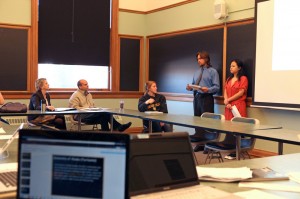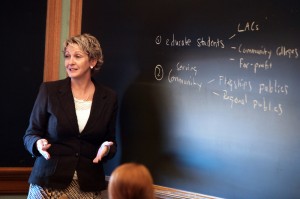Dear Alumni, Parents, and Friends of Colorado College,
Now I really know what the Block Plan is all about. For three and a half weeks in January and February, my husband and fellow economist, Kevin Rask, and I taught a class about the economics of higher education. Before the class I understood the concept of the block system, but I wanted to have a deeper sense of what our faculty and students experience during the semester.
Frankly, I also wanted to spend more time getting to know our students. Although we frequently meet during office hours and special events, teaching students in a class introduces them intellectually, which gives one a better grasp of the student culture that defines the college.
The Economics of Higher Education, designed for upper-level students who have taken some economics courses, explored topics that many other college presidents and I face today. Those include the escalating cost of education, the importance of alumni involvement, and the roles of boards and faculty in governing an institution.
At times, we focused on issues close to home. For example, one of the readings noted that alumni who live near their alma mater tend to give more — and give more often. At Colorado College, while our alumni show their love for the college in many ways and are generous in their giving, almost 60 percent live more than 1,000 miles away, which may partially explain why the percentage of our alumni who give annually is lower than those of many peer institutions. We must find new ways to reach out to our alumni and help them to feel more closely connected to the college, regardless of where they live.
In the classroom, Kevin and I saw a level of engagement we have rarely seen elsewhere. We attribute much of that to both the academic rigor of the college and the Block Plan. Now that I have a better understanding of how the Block Plan really works, I see that it exemplifies the very best of liberal arts learning.
When you are having a great conversation with students, the Block Plan helps keep it going because students don’t look at their watches every hour. The students also contribute so much more to the learning experience because of the sense of trust that develops when we spend focused time with one another. In our class, international students and students with different socioeconomic backgrounds especially brought their unique perspectives to bear when we examined issues of different educational systems around the world and the related challenges students face.
And because we spent so much time together, I found high levels of accountability for students to be there every day — on time and engaged — and for us faculty to make each class compelling. It was exciting to see how much we could accomplish in a very short time.
My experience in the classroom also has helped me to think creatively about the Block Plan. We recently observed the 40th anniversary of the plan — one of the most adventurous experiments in enhancing learning and teaching in higher education. Although it remains distinctive and unique, we need to keep that spirit of experimentation alive, improving wherever possible how the plan operates. The innovation and openness of our students and faculty inspire my confidence that there are more great things to come!
Of course, we are ahead in many respects. The Block Plan has prepared us to be experimental and adventuresome at our core. Given our great students and our excellent faculty, I’m even more excited about what the future holds.
With warm wishes,
Jill Tiefenthaler
President

